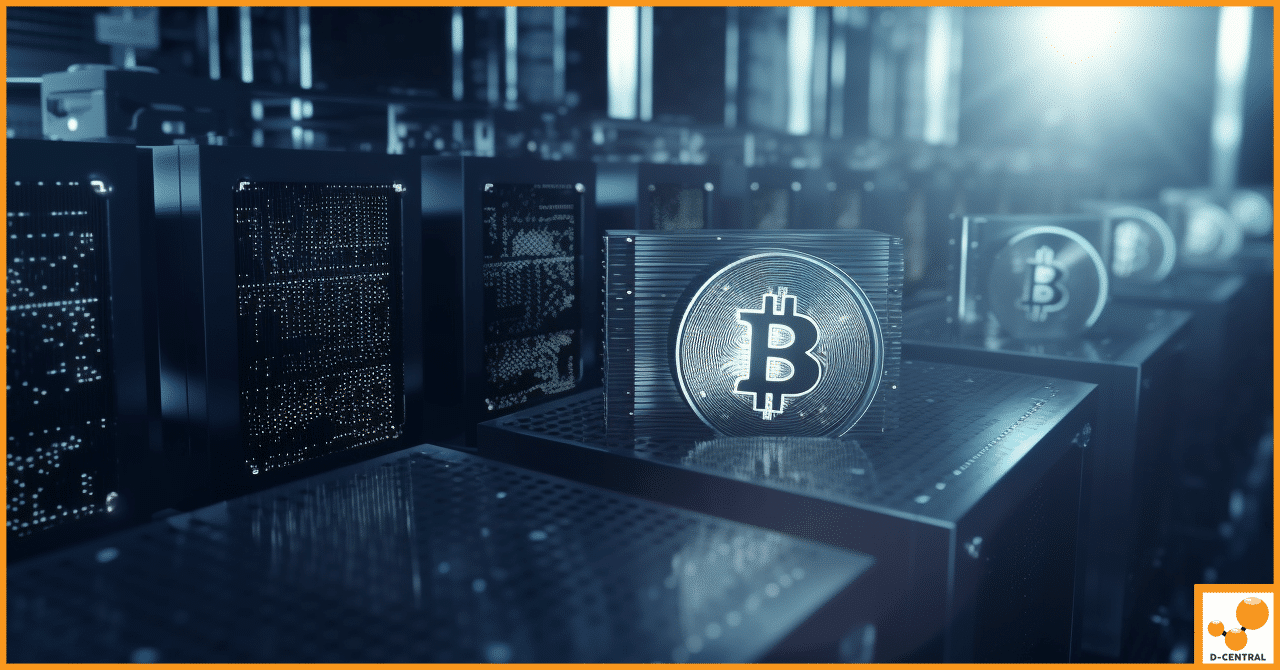
The Ultimate Guide to Safe and Effective Antminer Overclocking
In the ever-evolving world of cryptocurrency, Bitcoin mining stands as a cornerstone activity, underpinning the decentralized ethos of digital currency.
4479 Desserte Nord Autoroute 440, Laval, QC H7P 6E2

The Bitcoin mining industry, a cornerstone of the cryptocurrency world, has undergone significant evolution since Bitcoin’s inception in 2009. Initially a niche activity accessible to enthusiasts with basic hardware, it has transformed into a highly competitive and capital-intensive sector. The industry’s landscape is marked by rapid technological advancements, increasing hash rates, and a constant quest for energy efficiency. Amidst this backdrop, a new player has emerged, poised to make a substantial impact: Ocean Pool.
Ocean Pool represents a paradigm shift in the Bitcoin mining ecosystem. It’s not just another mining pool; it’s a beacon of innovation and decentralization in an industry that has seen increasing centralization over the years. This new pool, spearheaded by long-time Bitcoin Core developer Luke Dashjr, promises to address some of the most pressing issues facing Bitcoin mining today, including transparency, custodianship, and the centralization of block template construction.
The launch of Ocean Pool has been catapulted into the limelight with a significant investment led by none other than Jack Dorsey, the CEO of Block, Inc. (formerly Square, Inc.) and a well-known figure in the tech and cryptocurrency realms. Dorsey’s involvement is not just a financial endorsement; it’s a powerful statement about the future direction of Bitcoin mining. The investment, amounting to $6.2 million, was part of a seed funding round that also saw participation from other prominent investors such as Accomplice, Barefoot Bitcoin Fund, MoonKite, NewLayer Capital, and the Bitcoin Opportunity Fund.
Dorsey’s backing of Ocean Pool is particularly noteworthy given his outspoken support for Bitcoin and his advocacy for a more decentralized and user-empowered financial system. This investment aligns with his vision of leveraging technology to bolster financial inclusion and transparency. It also underscores a growing trend of significant investments flowing into the cryptocurrency sector, reflecting a broader recognition of its potential to reshape various aspects of our global financial landscape.
In summary, the emergence of Ocean Pool, backed by influential figures like Jack Dorsey, marks a pivotal moment in the Bitcoin mining industry. It heralds a return to the core principles of decentralization and transparency that have been foundational to Bitcoin’s philosophy. As we delve deeper into the specifics of Ocean Pool and its potential to revolutionize the industry, it’s clear that this new initiative could be a game-changer, setting new standards and paving the way for a more equitable and efficient mining ecosystem.
The story of Ocean Pool is deeply rooted in the history of Bitcoin mining, tracing back to the early days of the cryptocurrency. It begins with Eligius, one of the first Bitcoin mining pools, founded in 2011 by Luke Dashjr, a renowned Bitcoin Core developer. Eligius was notable for its pioneering approach, offering a non-custodial, transparent mining service at a time when the concept was novel in the Bitcoin community. This pool played a significant role in the early growth of Bitcoin, contributing to the network’s security and decentralization.
However, as the Bitcoin ecosystem matured, the mining landscape began to shift. The industry saw a trend towards centralization, with a few large pools gaining significant control over the mining process. This centralization posed a threat to the decentralized ethos of Bitcoin, potentially jeopardizing its security and censorship-resistant properties. Recognizing these challenges, Luke Dashjr envisioned a new kind of mining pool that would adhere to the original principles of Bitcoin – a vision that led to the transformation of Eligius into Ocean Pool.
Luke Dashjr’s vision for Ocean Pool was clear: to create a mining pool that would radically decentralize Bitcoin mining and address the growing concerns around centralization. Ocean Pool was designed to be the antithesis of the prevailing trends in the mining industry. It emphasized a non-custodial approach, ensuring that miners received their rewards directly from the network, thereby eliminating the risk of pool operators withholding or mismanaging funds.
Furthermore, Ocean Pool was built on a foundation of transparency. It offered full visibility into its operations, including block templates and generation payouts, allowing miners to verify and audit the process independently. This level of openness was a direct response to the opacity that had crept into some aspects of Bitcoin mining.
The transformation of Eligius into Ocean Pool gained significant momentum with the involvement of Jack Dorsey, the CEO of Block, Inc. Dorsey, a vocal advocate for Bitcoin and its decentralized ethos, recognized the potential of Ocean Pool to realign Bitcoin mining with its foundational principles. His decision to lead a $6.2 million investment round in Ocean Pool was a testament to his belief in the project’s mission.
This investment round, which also attracted other notable investors, provided the financial backing necessary to scale Ocean Pool’s operations and technological development. It enabled the pool to invest in advanced mining protocols, like Stratum V2, and explore innovative solutions such as integrating Lightning Network payouts. This influx of capital was not just a financial boost but also a strong vote of confidence in the pool’s ability to disrupt the Bitcoin mining industry and steer it towards a more decentralized and transparent future.
In conclusion, the genesis of Ocean Pool is a story of innovation, commitment, and strategic partnerships. From its roots as Eligius to its transformation into Ocean Pool, backed by significant investment and industry support, this new mining pool stands as a beacon of hope for a more decentralized, transparent, and secure Bitcoin mining ecosystem.
A cornerstone of Ocean Pool’s mission is its non-custodial approach to Bitcoin mining. This model is a significant departure from traditional mining pools where the pool operator collects and distributes mining rewards. In contrast, Ocean Pool ensures that miners receive their rewards directly from the Bitcoin network. This direct payout system not only enhances the security of miners’ earnings but also fosters a greater level of trust between the pool and its participants. By eliminating the intermediary role of the pool in handling rewards, Ocean Pool mitigates the risk of mismanagement or malfeasance, ensuring that miners have full control over their earned bitcoins.
Transparency is a fundamental principle at Ocean Pool. The pool provides complete visibility into its operations, particularly in the areas of block template creation and reward distribution. This level of transparency allows miners to independently verify and audit the pool’s processes, ensuring that there are no hidden mechanisms or unfair practices. By offering an open and transparent operation, Ocean Pool sets a new standard in the industry, encouraging accountability and trustworthiness, which are crucial for the integrity and sustainability of Bitcoin mining.
Ocean Pool is deeply committed to combating the centralization trends in Bitcoin mining. The pool’s design and operational philosophy are geared towards decentralizing the mining process, thereby reinforcing the core ethos of Bitcoin. By distributing mining power more evenly and ensuring that no single entity has disproportionate control over the network, Ocean Pool plays a vital role in maintaining Bitcoin’s security and resistance to censorship. This focus on decentralization is not just a technical feature but a strategic move to align with the original vision of Bitcoin as a decentralized digital currency.
Inclusivity is another key aspect of Ocean Pool’s mission. The pool supports a wide range of Bitcoin address types, including P2PKH, P2SH, Bech32, and Bech32m. This inclusivity ensures that miners with different types of Bitcoin wallets can participate in the pool without facing compatibility issues. By accommodating various address types, Ocean Pool demonstrates its commitment to flexibility and accessibility in mining. This approach not only broadens the pool’s appeal to a diverse group of miners but also reinforces the principle of openness that is central to the Bitcoin community.
In summary, Ocean Pool’s mission and core features – its non-custodial approach, commitment to transparency, focus on decentralization, and support for various Bitcoin address types – collectively represent a transformative shift in the Bitcoin mining landscape. These features are designed to realign mining practices with the foundational principles of Bitcoin, ensuring a more secure, trustworthy, and inclusive mining environment.
In-Depth Look at TIDES: Ocean Pool’s Unique Reward System
A standout feature of Ocean Pool is its reward system, known as the Transparent Index of Distinct Extended Shares (TIDES). This system represents a significant advancement over traditional payout schemes like PPLNS or FPPS. TIDES operates on a principle of complete transparency and accuracy in reward distribution. As miners contribute their computational power, TIDES ensures that they receive a precise, pro rata portion of the rewards based on their contributed hashrate. This system is not only more transparent but also more equitable, as it does not rely on approximations or ‘shifts’ that can often lead to less accurate payments. Furthermore, TIDES includes transaction fees in the block reward calculations, ensuring that miners receive their full due for the work done. This level of precision and fairness in payout distribution sets Ocean Pool apart in the mining industry and underscores its commitment to empowering miners with fair and transparent compensation for their efforts.
The TIDES reward system in Ocean Pool presents distinct advantages over traditional models like PPS (Pay Per Share) and PPLNS (Pay Per Last N Shares), especially for a diverse range of Bitcoin miners, from individual ‘pleb’ miners using innovative solutions like Bitcoin Space Heaters to larger-scale operations engaged in grid balancing and curtailment. Unlike PPS, which offers a fixed payment per share regardless of actual block discovery, TIDES ensures a more equitable distribution of rewards based on actual hashrate contribution, making it particularly beneficial for smaller miners who might not consistently contribute large amounts of hashrate. This contrasts with PPLNS, which can disadvantage miners with intermittent mining activity due to its focus on shares submitted in a specific time frame. TIDES, with its emphasis on real-time contributions, ensures that all miners, regardless of operational scale or consistency, are fairly compensated. This is especially advantageous for larger miners facing curtailment, as TIDES accurately accounts for fluctuating contributions without penalizing periods of reduced activity. Overall, TIDES offers a more inclusive and balanced approach, democratizing the mining process by ensuring that every miner, big or small, is rewarded in direct proportion to their actual contributions, fostering a healthier and more equitable Bitcoin mining ecosystem.
One of the most significant technological innovations at the heart of Ocean Pool is the implementation of Stratum V2, a new mining protocol designed to further decentralize Bitcoin mining. Stratum V2 is a substantial upgrade over its predecessor, offering several key improvements that align with Ocean Pool’s mission of decentralization. This protocol enhances the distribution of decision-making power in the mining process, allowing individual miners more control over which transactions are included in the blocks they mine. This shift not only reduces the potential for centralized control but also increases the overall security and robustness of the Bitcoin network. Additionally, Stratum V2 introduces better efficiency and lower bandwidth requirements, making it more accessible for miners with varying levels of resources.
Ocean Pool is also pioneering the integration of the Lightning Network for miner payouts. This innovative step addresses the challenge of small payouts, which can be problematic due to transaction fees and the time it takes for transactions to be confirmed on the Bitcoin blockchain. By utilizing the Lightning Network, Ocean Pool can offer instant, low-cost payouts, making it feasible for miners of all sizes to receive their rewards more efficiently. This integration not only enhances the user experience for miners but also contributes to the broader adoption and utility of the Lightning Network, furthering its development as a scalable solution for Bitcoin transactions.
Looking ahead, Ocean Pool has outlined ambitious plans for future phases of Bitcoin decentralization improvements, with several upgrades slated for 2024. These upgrades are focused on further enhancing the decentralization and efficiency of the mining process. Key areas of development include advanced block template construction methods that distribute the power of transaction selection more evenly across the network, and further optimizations to the mining protocol to ensure even greater participation from a diverse range of miners. Additionally, Ocean Pool plans to explore new technologies and methodologies that could contribute to the overall health and decentralization of the Bitcoin network, ensuring that it remains resilient, secure, and true to its decentralized ethos.
In conclusion, the technological innovations and future plans of Ocean Pool represent a forward-thinking approach to Bitcoin mining. The implementation of Stratum V2, the integration of the Lightning Network for payouts, and the planned upgrades for 2024 all demonstrate Ocean Pool’s commitment to pushing the boundaries of what is possible in Bitcoin mining. These efforts are not just about improving a single mining pool; they are about contributing to the evolution of Bitcoin as a decentralized, secure, and efficient digital currency.
One of the critical challenges in the Bitcoin mining industry that Ocean Pool aims to address is the centralization of block template construction. In traditional mining pools, the pool operator typically has sole control over the creation of block templates, which includes deciding which transactions are included in a block. This centralization poses a significant risk to the Bitcoin network, as it potentially gives a small number of pool operators disproportionate influence over the transaction selection process. Ocean Pool confronts this issue head-on by implementing a more decentralized approach to block template construction. By distributing this power among a broader base of participants, Ocean Pool ensures a more democratic and fair process, aligning with the decentralized nature of Bitcoin itself.
Another major concern in the industry is the issue of custodianship in traditional mining pools. In many pools, miners’ rewards are held by the pool operators until they reach a certain threshold, at which point they are distributed. This custodial model introduces several risks, including the potential for mismanagement or loss of funds, and it places a significant amount of trust in the hands of the pool operators. Ocean Pool’s non-custodial approach eliminates these risks by allowing miners to receive their rewards directly from the Bitcoin network. This model not only enhances the security of miners’ earnings but also fosters greater trust and autonomy within the mining community.
Transparency in mining operations is crucial for maintaining the integrity and trustworthiness of the Bitcoin network. In many existing pools, there is a lack of visibility into key aspects of the mining process, such as how block rewards are calculated and distributed. This opacity can lead to suspicions of unfair practices and undermine the confidence of miners and the broader community in the mining process. Ocean Pool addresses this need for greater transparency by providing full visibility into its operations, including the construction of block templates and the distribution of mining rewards. This commitment to openness ensures that all participants can verify and trust the processes involved in mining, reinforcing the principles of fairness and accountability that are essential to the health and sustainability of the Bitcoin network.
In summary, Ocean Pool’s approach to addressing the industry challenges of centralization in block template construction, custodianship issues, and the need for greater transparency sets a new standard in the Bitcoin mining industry. By tackling these issues head-on, Ocean Pool is not only enhancing its own operations but is also contributing to the broader effort to maintain Bitcoin’s decentralized, secure, and transparent nature.
One of the most immediate benefits for miners joining Ocean Pool is the zero-fee structure implemented for the initial months of operation. This approach is particularly advantageous for new and small-scale miners, as it reduces the barriers to entry and maximizes their potential earnings. By waiving fees, Ocean Pool demonstrates a commitment to supporting the mining community, especially those who might be deterred by the cost implications of joining a mining pool. In the long term, Ocean Pool aims to maintain a competitive fee structure that aligns with its mission of decentralization and support for the mining community. These incentives are not just about short-term gains but are part of a broader strategy to cultivate a healthy, diverse, and sustainable mining ecosystem.
Ocean Pool’s design and operational philosophy are centered around empowering individual miners and small-scale operations. The TIDES reward system, in particular, offers a distinct advantage over traditional models like PPS and PPLNS. Unlike PPS, which provides a fixed payment per share, and PPLNS, which can disadvantage miners with intermittent mining activity, TIDES ensures a more equitable distribution of rewards based on actual hashrate contribution. This is especially beneficial for smaller miners and those facing operational fluctuations, such as curtailment. By offering a non-custodial approach and supporting various Bitcoin address types, Ocean Pool ensures that miners of all sizes have equal access and control over their earnings. This empowerment is crucial in an industry that has seen a trend towards centralization and dominance by large-scale mining operations. Ocean Pool’s commitment to decentralization and transparency provides individual miners with more autonomy, a fairer playing field, and the ability to contribute meaningfully to the Bitcoin network. This inclusive approach not only benefits individual miners but also helps to preserve the decentralized nature of Bitcoin mining.
The impact of Ocean Pool extends beyond individual miners to the broader Bitcoin ecosystem. By championing decentralization and transparency, Ocean Pool contributes to the overall health and resilience of the Bitcoin network. A more decentralized mining landscape enhances the security of the network, as it reduces the risk of concentrated control and potential manipulation. Furthermore, Ocean Pool’s innovative use of technologies like Stratum V2 and the Lightning Network for payouts represents a step forward in the efficiency and scalability of Bitcoin mining. These advancements benefit the entire Bitcoin community by ensuring a more robust, secure, and efficient network. Ultimately, Ocean Pool’s efforts in promoting a decentralized mining environment align with the core principles of Bitcoin and contribute to its ongoing evolution as a decentralized digital currency.
The benefits of Ocean Pool for miners and the Bitcoin community are multifaceted. From the immediate financial incentives of zero fees to the long-term empowerment of individual miners and the broader impact on Bitcoin’s decentralization, Ocean Pool is setting a new precedent in the mining industry. Its approach not only supports the current generation of miners but also paves the way for a more inclusive, secure, and decentralized future for Bitcoin mining.
Ocean Pool stands at the forefront of a new era in Bitcoin mining, embodying a transformative potential that could significantly reshape the industry’s landscape. Its innovative approach, which emphasizes decentralization, transparency, and inclusivity, challenges the status quo of the current mining ecosystem. By addressing the critical issues of centralization, custodianship, and lack of transparency, Ocean Pool is not just another mining pool; it is a harbinger of change, signaling a return to the foundational principles that Bitcoin was built upon.
The introduction of technologies like Stratum V2 and the integration of the Lightning Network for payouts are more than just technical enhancements; they represent a philosophical alignment with the ethos of Bitcoin. These innovations have the potential to democratize mining, making it more accessible and equitable for miners of all sizes. The zero-fee structure in the initial months and the long-term vision for a competitive and fair fee system further underscore Ocean Pool’s commitment to supporting a diverse mining community.
Looking towards the future, the trajectory set by Ocean Pool could have profound implications for the Bitcoin mining industry. The move towards a more decentralized mining process is not just a technical necessity but a vital step in preserving the integrity and security of the Bitcoin network. As Ocean Pool leads by example, it may inspire other mining pools and industry stakeholders to adopt similar principles and technologies, fostering a more balanced and decentralized mining ecosystem.
The broader impact of this shift towards decentralization extends beyond mining. It touches on the very heart of what Bitcoin represents – a decentralized, secure, and open financial system. By reinforcing these principles within the mining sector, Ocean Pool contributes to the resilience and longevity of Bitcoin as a whole.
In conclusion, Ocean Pool’s emergence is a pivotal moment in the Bitcoin mining industry. Its commitment to reshaping the mining landscape through decentralization, transparency, and inclusivity aligns closely with the original vision of Bitcoin. As the industry continues to evolve, the influence of Ocean Pool and similar initiatives will be crucial in steering the future of decentralized Bitcoin mining, ensuring that the network remains robust, secure, and true to its decentralized roots.
What is Ocean Pool?
Ocean Pool is a new player in the Bitcoin mining industry, offering a paradigm shift in the ecosystem. Spearheaded by long-time Bitcoin Core developer Luke Dashjr, it addresses central issues in contemporary mining, including transparency, custodianship, and centralization of block template construction.
Who backed the launch of Ocean Pool?
The launch of Ocean Pool has been supported by a significant investment led by Jack Dorsey, the CEO of Block, Inc. (formerly Square, Inc.) The investment amounted to $6.2 million and was part of a seed funding round that saw participation from a variety of prominent investors.
What is the Transparent Index of Distinct Extended Shares (TIDES)?
The Transparent Index of Distinct Extended Shares (TIDES) is Ocean Pool’s reward system. This system operates on a principle of complete transparency and accuracy in reward distribution. TIDES ensures a more equitable and accurate distribution of rewards based on the actual contributed hashrate of miners.
What is the role of Stratum V2 in Ocean Pool?
Stratum V2 is a new mining protocol implemented by Ocean Pool. It’s an upgrade over its predecessor and offers several key improvements including enhanced distribution of decision-making power in the mining process, increased overall security, better efficiency, and lower bandwidth requirements.
How does Ocean Pool plan to use the Lightning Network?
Ocean Pool is pioneering the integration of the Lightning Network for miner payouts. By utilizing the Lightning Network, Ocean Pool aims to offer instant, low-cost payouts, improving efficiency and accessibility for miners of all sizes.
What are the future plans of Ocean Pool for Bitcoin decentralization?
Ocean Pool has planned several upgrades for 2024 aimed at enhancing the decentralization and efficiency of the mining process. These include advanced block template construction methods and further optimizations to the mining protocol. Ocean Pool also plans to explore new technologies and methodologies contributing to the decentralization of the Bitcoin network.
DISCLAIMER: D-Central Technologies and its associated content, including this blog, do not serve as financial advisors or official investment advisors. The insights and opinions shared here or by any guests featured in our content are provided purely for informational and educational purposes. Such communications should not be interpreted as financial, investment, legal, tax, or any form of specific advice. We are committed to advancing the knowledge and understanding of Bitcoin and its potential impact on society. However, we urge our community to proceed with caution and informed judgment in all related endeavors.
Related Posts

In the ever-evolving world of cryptocurrency, Bitcoin mining stands as a cornerstone activity, underpinning the decentralized ethos of digital currency.

In the realm of cryptocurrencies, Bitcoin mining holds a pivotal role. This process involves powerful computers performing complex calculations to

As Bitcoin mining continues to gain traction, the race to reach one zettahash per second intensifies. This significant milestone not